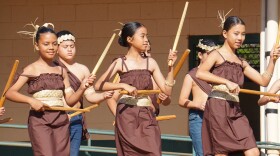It’s being billed as ResistanceFest — a concert organized by the group Allies of Resistance.
The group was formed by a mix of people across the community who wanted to rise up in protest against actions taken during President Donald Trump's second term.
The Conversation sat down with scholar and musician Jon Osorio on Monday afternoon. He also happens to be the dean of the Hawaiʻinuiākea School of Hawaiian Knowledge at the University of Hawaiʻi.
He is headlining the ResistanceFest on Friday evening at the St. Louis Alumni Clubhouse in Mōʻiliʻili, along with cellist Anna Callner and The Hot Club of Hulaville.
The gathering is organized by what he says are like-minded people who share a belief about how to treat people. Osorio and HPR’s Catherine Cruz chatted about protest songs and building a movement against the backdrop of the event.
Interview highlights
On the power of protest music
JON OSORIO: You always want to see these kinds of social movements really enriched by music and poetry and art. And in the past, this has been the case, going back into the 1960s, when opposition to the Vietnam War and the concern over civil rights for all people in America, voting rights. When those things come together, and they really illuminate and they inspire numbers of people to get involved, to become advocates for those things, it's not surprising that the music of the period, and songwriters of the period who were speaking to those issues came to the fore and their music was popular there. They had huge record sales, Bob Dylan, Simon & Garfunkel, all those folks. And those songs and that cultural explosion also then inspire more people to take on those kinds of beliefs and causes over a lifetime. And I'm one of those people, growing up in high school in the 1960s and being surrounded by that hopefulness of that period. And then what's different now, I think, is that some people don't find our current situation hopeful, and yet, the belief in certain behaviors and attitudes and the way we look at people and the way we treat people, those things are still very powerful in Hawaiʻi.

On ResistanceFest and the younger generation participating in social movements
OSORIO: The hope is that young people can be inspired to speak, to sing, to compose, to let their creative energies flow into this because it's really important. And I don't know who's going to be there. I don't know who's going to be in the audience. My guess is that they're going to be people around my age and maybe slightly younger, and that's important for us just to reassure ourselves that even in the autumn of our lives, we still hold fast to these kinds of ideals. But it's much more important that young people start to believe in them as well, start to feel some sense of hope and a sense that they can actually address and change and shape the future.
On the current government
OSORIO: I always think that it's odd to see America, the United States of America, in this shape, basically, where government officials are denying science, denying facts, right, and really presenting very alternative kinds of explanations of what's going on in the country and in the world. That's crazy to me, but I don't think that people have really changed much in terms of where this society was heading. We were heading in an area where we believed in the basic dignity of all people, regardless of their race or their gender or their sex or anything, we just, this is where we were headed, and somehow or another, I feel that we've all been distracted by a weird government takeover that really doesn't have any particular agenda except to stop that, that movement, and I don't think that they can.
On the impact of singing
OSORIO: I've said this to people around me, that for all the work that I do here at this university and in the community organizations I belong to, the only thing I really believe matters, the only thing that I think is really effective is when I'm singing. And this is one of the reasons why I'm so looking forward to this, because I feel like, when you're singing, you're really doing something that's pretty pure. It comes from a spiritual core. It's expressed emotionally. It is honest and it's true, and it's one of the things that I think is keeping me sane. I hope that when people come to this that there are some people there who don't agree with my perspective or the things I believe, I just like them to hear what it sounds like when you're actually saying those things as truthfully, as honestly and as clearly as you can. And we do that when we sing.
For more information about how to buy tickets to ResistanceFest, click here.
This story aired on The Conversation on Aug. 12, 2025. The Conversation airs weekdays at 11 a.m. Hannah Kaʻiulani Coburn adapted this interview for the web.





